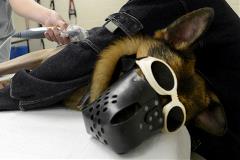Lasers Offer Benefits to Patients and Surgeons

Lasers
Lasers are everywhere. These items, for example, are common objects that are encountered every day and they all have lasers inside of them:
- CD and DVD players
- Barcode scanner
- Laser pointer, otherwise used as the ever popular red dot of light that cats are fascinated by!
While these items can often be found within a clinic, it is the class of lasers used within surgical procedures that are proving so advantageous in the veterinary field.
Down to Basics
The following offers a basic explanation of the process of light being turned into a laser beam:
- Within a laser chamber:
- Light passes through a lasing medium, such as a:
- Solid crystal
- Liquid
- Gas, most commonly carbon dioxide
- Semiconductor crystals
- While passing through the lasing medium, the light atoms gain energy
- At the end of the laser chamber:
- The now higher energy atoms pass through a partially reflective mirror
- When exiting the chamber:
- The light has become a beam that is highly concentrated and capable of providing intense power
- The original light beam is now capable of cutting
In conventional surgery, a scalpel was the cutting tool used to interact with tissues. When performing laser surgery, the scalpel has been replaced with a highly focused beam of light. The laser beam has an advantage over a scalpel because of its ability to ablate and seal living tissues.
Benefits to the Patient
Laser surgery provides the following advantages to patients:
- Lessens bleeding by cauterizing small blood vessels as laser cuts through tissues
- Minimizes pain when cutting through tissues by sealing nerve endings
- Decreases swelling by sealing lymphatic tissue
- Lowers risk of infection
- As the laser cuts, it produces a sterilizing effect by killing bacteria within and around the incision area
- Reduces the time an animal is under anesthesia
- Hastens recovery time
- The combination of reduced bleeding, pain, swelling, and chance of infection offers quicker patient recovery
- Patient is also less likely to lick, bite or scratch at wounds, which will lessen wound irritation to speed recovery
- Increases surgical opportunities for patient
- Some surgeries previously deemed as not practical with a scalpel can be performed with the laser because of the decrease in bleeding
It is important to note that the benefit of reduced pain and discomfort may provide a disadvantage with some animals. For example, a dog that feels good may return to their regular activity level before their wound has completely healed. To protect against this type of situation, clients should be reminded of their animal’s need for an established recovery period.
Benefits to the Surgeon
The following offers a small list of the types of procedures that are benefited by laser use:
- Surgical field
- General surgery:
- Wound debridement
- Mast cell tumors
- Ophthalmology:
- Cherry Eye
- Eyelid tumor removal
- ENT and Oral:
- Ear crop
- Ear canal polyp removal
- Tongue lesions
- Dermatology:
- Skin tag removal
- Follicular cysts
- Equine:
- Umbilical hernia repair
- Castration
Surgeons find that the use of lasers helps to:
- Control blood loss
- Optimize visualization of surgical field
- Provide the surgeon with a clear and dry surgical area
- Increase control and precision of the incision and cut
- Can reduce or eliminate the need for some drugs
- Reduce time spent in surgery
- Improve chances of some surgical capabilities
- Enable opportunity for surgeries not previously deemed practical using conventional methods
Caution Tips
Educating staff on the dangers of laser use is just as important as training staff on the use of lasers. For example, workers risk:
- Eye or skin injuries if exposed to a direct or reflected laser beam
- Eye or skin injuries if non-reflective instruments are used during surgery
- Eye injuries if appropriate eye protection is not used correctly during surgery
- Electric shock if equipment is not handled correctly
- Potential for fire when direct or reflected laser beams are pointed at combustible materials.
To discuss the use of lasers in your practice, contact your Covetrus representative at 855.724.3461.
Information Taken From:
http://healthypets.mercola.com/sites/healthypets/archive/2012/08/24/laser-treatment-in-veterinary-medicine.aspx
http://www.deerhound.org/Health/Claymore_Articles/ModernAdvancesinSurgery_May_Jun04.pdf
Careers
Are you looking for a place to let your talents shine? At Covetrus, we help our practitioner customers better serve their patients and take pride in providing the best customer experience possible. Search our open positions to see our available opportunities.
Newsletter
Stay current with what’s going on with Covetrus, subscribe to receive our newsletter and email communications. Subscribers will receive the latest information in practice management, sales and marketing, animal health, and more.


Leave a comment